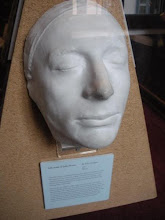
We all know the story. Even if we don't know the story, we do. The story of the beautiful young queen beheaded by her people is one that lives in our subconcious even if we don't realize it (Sophia Coppella anyone?). Who doesn't feel a pang of horror at the thought of any woman having her best friend butchered, her husband murdered by the people he employs, her children torn from her and finally being killed herself?
Is it gruesome? Is it justice? The two camps were and are rigidly divided.
THE GOOD QUEEN
THE GOOD QUEEN
Grace Darympole Elliot was a British courtesan also went to the Temple Prison. In her memoirs, she recalls the betrayed queen as "virtuous". She says that Marie Antoinette was as "aimiable and good a princess as ever lived." Madame Elliot even goes so far as to say that the Queen's own servants recalled her as "goodness itself", a "kind and most affectionate mistress." Then again, Madame Elliot spent her life as a social climber and professional mistress to scores of royal dupes. So. Why should we care about a Queen who counts Madame Elliot as a friend?
* She was a neglected daughter of the great empress of Austria -- Maria Therese. It is said that she was so neglected by her imperial mother who had another favorite that the girl could barely read and write in German. She also continued to get scathing letters from her mother listing all of her failures as a sovereign and wife from her doting mama.
* She was married off to a stranger at 14 years old and was the laughing stock of France when she and Louis could not consumate the marriage because of his erectile dysfunction. Of course, he was only 15 himself...
* She had to deal with life-term mistresses (the ruthless Madame Du Barry) and other older courtesans who hated Austrians (Seven Years' War). They thought she was a brainless, spineless, childless, twit. At fifteen. Which of course begs the age-old question: why do women do everything in their power to destroy other women?
* She had to deal with life-term mistresses (the ruthless Madame Du Barry) and other older courtesans who hated Austrians (Seven Years' War). They thought she was a brainless, spineless, childless, twit. At fifteen. Which of course begs the age-old question: why do women do everything in their power to destroy other women?
* Her husband hated Austrians (Seven Years' War) and practically said nothing to her. Ever. Which does little to improve erectile dysfunction.
* After Louis's "operation", she had four children but two died and she was left desolate by their passings.
* She was too young to know who her enemies were or how to successfully navigate in any political climate.
* She was too young to know who her enemies were or how to successfully navigate in any political climate.
* Her best friend was dismembered.
* Her husband was beheaded.
* She was spat on, thrown waste at and finally beheaded herself.
* She apologized to the excecutioner for stepping on his feet.
THE INFAMOUS L'AUTRICHIENNE!
L'Autrichienne was the name disappoving old prigs (women) gave the young queen. Translation: The Austrian Woman -- which was a very bad thing coming out of a seven year war with Austria. But they were clever and soon found a way to say L'Autrichienne in such a way that it could combine the hated enemy and the French word for Bitch. Always thinking, those courtesans.... They hated her.
* She was young and beautiful
* She would be queen.
* She was often "loud" and uncouth according to French standards of grace and etiquette.
* She had an addiction to gambling, suitors, and legendary parties.
* She didn't consumate her marriage for seven years. Almost a decade. Which would put her at... that's right... 22.
But let's be honest. Which royal inner circle is warm and nurturing? Which band of beautiful, popular, rich women gets together to improve each other's soul and care more for her friend than for herself? All of these grievances would have remained petty jealousies, irritating but par for the course if the people hadn't risen up and said: "Rawr!!!!" (see yesterday's blog entry).
Life for the peasant in the late 1700's meant a 16 hour work day with a forced FREE labor day during the month (your Sunday, if you please) to do things fun, easy things like, pave the roads. Hey, we all need exercise! It also meant paying taxes to the church, the monarchy and the local nobility out of their crop. Meanwhile, the church, the monarchy and the local nobility were all virtually tax free. They didn't pay a dime. The king had a little something called the lettre de cachet. Roughly translated, this means "Asta la vista, baby." The king could throw you in jail without trial for the rest of your life. Add to all of this a famine where the people who work, build, and pay for the country are starving, you get "unrest."
The people HATED the court but most importantly, they hated Marie Antoinette. More than anyone.
Why?
* The queen had an annual allowance for dresses which came to 150,000 livres which was nearly 300 times greater than the average annual income for one of the schleps paying the taxes for all those dresses.
* She ran up debts, every year, closer to 500,000 livres even though country was in near economic ruin from money spent on wars (one of which was called the American Revolution).
* She was Austrian and constantly suspected of being a spy (which of course the war Austria declared on France during this little misunderstanding didn't help).
* Between the 500,000 for a Queen a la mode and the wild gambling parties, the palace kept 300 cooks, 2000 horses, 700 rooms and 20 kilometers of roads.
* After the revolution began and the reforms had started, the Queen (and king but no one cares about him) took the cap of "liberty" and trampled it under their feet. Probably not a good idea but especially bad when in the middle of a drunken feast when the entire country is starving.
Is this all her fault? Was she a callous, ridiculous woman who drove the people to madness? Was she a pawn in a wider political arena? The fact that France chose a queen who could not read or write with a fetish for debaucherous living is interesting in itself.
But does a silly young woman deserve to die simply because she's silly?
I don't know. I've never watched my family die of starvation while the people I give my food to can't quite keep the dress budget under 500,000 livres.
One last note. When the women from Paris stormed Versailles to demand audience with a queen hiding in her bed chamber, several of them fainted when they saw the splendor of the palace. This was the palace they'd paid for, their husbands and sons, never having known that there was anywhere that beautiful on earth. They almost forgot why they were there: there was no grain, no bread, no food at all in the city and Marie Antoinette was having feasts.



























Ok, say you're a poor, uneducated french peasant that is watching her children starve while some stupid (perhaps naive) Austian woman rules your counrty in luxury...OF COURSE you're going to chop her head off! It had to be done. I'm not saying the mode of death was great or that the heads rolling in the street was appetizing but she had to go. Someone had to.
ReplyDeleteYeah, I mean, she had prejudice from the start, so the stories that were told and passed on were bound to be biased and negative. Beyond that, she was an aristocrat all of her life, that's what she knew. As a queen, she had to put on an extravagant and luxurious image, or it would make the French people look poor and uncultured. They didn't want a lavish queen, but I don't they'd like one that was dirty and ragged. Also, being an aristocrat, she would have been completely out of touch, never actually experiencing "real life" and I doubt she would have been told the problems. As queen, she'd perhaps would have been told stuff like "oh, it's not so bad," or "they're just complaining." Many other aristocrats did the same things and acted in similar ways, it's just that she came at a revolution, and was was therefore the one we know. --That's not saying she was a saint though. But, look at how much our politicians spend on jets and clothes.
ReplyDelete